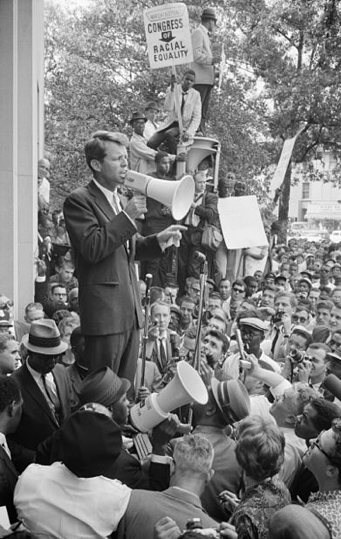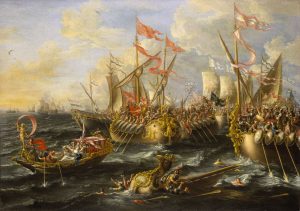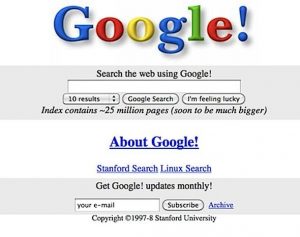On March 16, 1968, Robert F. Kennedy declared that he was running for president of the United States. Robert Kennedy was a humble man, stating that he was not running for president to oppose any man, but to propose new policies. With his brother leaving a big impact on so many, Robert F. Kennedy had big shoes to fill. The start of his pursuit for the presidency of the United States began when he became the 64th US Attorney General on January 21, 1961. On November 22, 1963, Robert lost his older brother, John F. Kennedy, after he was fatally shot in Dallas.1
After his brother had been killed, Robert Kennedy resigned as Attorney General less than a year later, in September of 1964. Wanting to do something different, Robert announced his intent to run for Senate. He successfully became the Senator of New York in 1965 and then began advocating for the poor, for human rights, and against racial discrimination. But he wondered to himself whether he should run for president or not.2 However, he wasn’t motivated to pursue the presidency because of many factors, one of them being his brother’s assassination.
Robert Kennedy was a prominent member of the Democratic Party. Kennedy had liberal views for what he thought would be better for the people of the United States. He thought that everyone should be treated equally and be treated like human beings. He wanted to desegregate schools, and wanted all people to enjoy the same rights. After waiting anxiously and not knowing whether he would run for the Democratic Party’s presidential campaign or not, he finally decided he would run for president, and his presidential campaign began in March 1968. He was prepared to take a risk in order to accomplish what he wanted and what he believed in.3 Something inside of him wanted to make a difference and change America for the better. He was actually a late entry in the primary race for the Democratic Party’s presidential nomination.
Kennedy focused on the issues of social improvement, economic justice, and racial equality. The Democratic Party supported Robert F. Kennedy and they helped him launch his presidential campaign. On March 16, 1968, Robert Kennedy’s presidential campaign began, even before Lyndon B. Johnson announced he wouldn’t run for re-election. He was willing to challenge Johnson for the nomination, which was clearly a risk.

Robert Kennedy gave his first campaign speech at Kansas State University, where he drew a record crowd. In his speech, he spoke out about ending the Vietnam war, then he continued on to the matter of poverty, emphasizing the horror he felt when he saw what poor Americans had to face every day. Towards the end of his speech, he quoted George Bernard Shaw: “Some people see things as they are and say, why? I dream things that never were and say, why not.”4 This quote would become the centerpiece of Kennedy’s presidential campaign and help express the mindset he had about what he wanted to do if he became president. He wanted to create things and change things.
Youth engagement was critical for his campaign. He tried to inspire young leaders, and he created a national resource center for juvenile justice, by giving opportunity to juveniles to do more with their lives. His political platform was structured around racial equality and economic justice. He supported non-aggression in foreign policy, and social improvement for the poor and for people who were segregated.5 Robert F. Kennedy wanted to desegregate schools and wanted every American to have the same rights as every other American. He even spoke to civil rights activist Cesar Chavez, who was just ending a 25-day hunger strike over the treatment that farm workers were enduring.
On March 31, Lyndon B. Johnson stunned the nation by dropping out of the presidential race. At that time there were only fourteen states that held primary elections: California, Florida, Illinois, Indiana, Massachusetts, Nebraska, New Hampshire, New Jersey, Ohio, Oregon, Pennsylvania, South Dakota, Wisconsin and West Virginia. Robert Kennedy had won two primary states: Indiana and Nebraska. When Martin Luther King Jr was shot, on April 4, 1968, Kennedy gave an improvised speech in Indianapolis, Indiana, speaking at two universities. He then boarded a plane to attend campaign rallies, honoring the death Martin Luther King Jr emphasizing his love for life and justice for the people. Robert Kennedy began addressing the people, asking them whether the nation would choose to continue to be segregated and fall apart, or whether it would move together as a country to achieve more. King’s death was an important moment that made many people see that a change was needed.6 Kennedy was behind Hubert Humphrey, Johnson’s Vice President, who had entered the race after LBJ declined to run. At the time, Humphrey was seemed to have an advantage over Kennedy in delegate support, but a victory in California’s primary could turn the tide in Kennedy’s favor.

Things were beginning to look good for Robert F. Kennedy. Then, suddenly, things took a stunning turn for the worst.
On June 5, 1968, presidential candidate Robert F. Kennedy was at the Ambassador Hotel in Los Angeles. It was the evening of the California primary, and the results were just coming in that Kennedy had won both South Dakota and California. He gave a triumphant victory speech, speaking to journalists and campaign workers and supporters. The speech was carried live on television. His victories in the California and South Dakota primary elections gave Kennedy the boost he needed to go into the Democratic Party Convention that summer with confidence that he would win the Democratic nomination for President of the United States. After leaving the podium and exiting through a crowded kitchen hallway, he began to have a conversation with a busboy named Juan Romero. Juan Romero was very grateful that a simple busboy like himself was able to interact with the potential president of the United States. But in the blink of an eye, while shaking the hand of Juan, Robert Kennedy came face to face with a 24-year-old Palestinian immigrant named Sirhan Sirhan. Sirhan suddenly shot Kennedy multiple times with a .22 caliber revolver. Kennedy’s body immediately dropped to the floor and everyone was in shock. Kennedy was later transferred to the Good Samaritan Hospital, where he was pronounced dead the following day.7
After Kennedy’s death, Juan Romero said, “This made me realize that no matter how much hope you have, it can be taken away in a second.”8 Kennedy’s remains were then flown back to St. Patrick’s Cathedral in New York for public viewing before a funeral mass. Thousands of mourners attended in order to see Robert Kennedy’s lifeless body. His blood-stained shirt, tie, and jacket are now in the possession of the Los Angeles County District attorney. Kennedy was then buried near his older brother John Kennedy, in Arlington National Cemetery.
It was later revealed during a search of Sirhan’s home that he held strong anti-Zionist beliefs and, in a diary, he wrote that he was determined to kill Robert Kennedy before June 5, 1968, because that was the first anniversary of the start of the Six-Day War between Israel and its Arab neighbors, and he resented Kennedy and his beliefs. He just held an overpowering hatred for Kennedy. He expressed that hatred toward Kennedy when he found out that Kennedy supported Israel and his attempt to send fifty bombers to Israel to harm the Palestinians. Sirhan was sentenced to death, but it was later commuted to life in prison.9

Later on, as the 1968 election progressed, Richard Nixon won the presidential election. Many believe Kennedy would have ultimately secured his nomination after successfully winning the California primary, were it not for his tragic death; and that he would have gone on to be elected president.10
After Kennedy’s death, things turned into chaos for the Democrats. The Democratic National Convention was held in Chicago in August. The purpose was to select a new presidential nominee to run as the Democratic party’s candidate for office. The Democratic Party ended up choosing Humphrey to run. But the way he was chosen was anything but civil. Party members and the Left were left devastated and demoralized in the wake of Kennedy’s death. Chicago was chaotic, both inside the convention hall and outside on the streets. One can only wonder how it all would have gone, had Kennedy lived.
- Robert F. Kennedy (John F. Kennedy Presidential Library and Museum), May 20, 2017. Accessed August 30, 2018. ↵
- Thurston Clarke, The Last Campaign : Robert F. Kennedy and 82 Days That Inspired America (New York : Henry Holt, 2009, 37-46. ↵
- Diane Nixon, “The Case of the Robert F. Kennedy Assassination Investigation Files,” The Public Historian (2008): 11, 29-35. ↵
- Ray E. Boomhower, Robert F. Kennedy and the 1968 Indiana Primary (Bloomington, Indiana University Press, 2008), 35-41. ↵
- Nora Rawlison and Robert F. Nardini, “Robert Kennedy,” Library Journal 113 (13) (1988): 156-162. ↵
- Micheal Rosenwald, “Robert F. Kennedy’s Remarks on the Assassination of Martin Luther King Jr,” The Journal of Blacks in Higher Education 55 (2007): 5. ↵
- Mel Alyom, Sirhan Sirhan and the Assassination of Robert F. Kennedy (Washington D.C.: 1st Ed Potomac Books, 2007), 60-67. ↵
- John Rogers and Russell Contreras, “Busboy Comforted a Dying Robert Kennedy,” Globe & Mail (Toronto, Canada 2018). ↵
- Ilene Cooper, The Assassination of Robert F. Kennedy (American Library Association / Booklist Publications), 44-50. ↵
- Kenneth Walsh, Shattering the Hope (U.S. News. June 1, 2017) Accessed September 9, 2018. ↵



67 comments
Max Lerma
This article was incredible and is a great addition to our media project. I believe that you perfectly captured the hope and the motivation that Robert Kennedy inspired in millions across the country. Robert Kennedy may have been killed, but the ideas he fought for lived on and I believe that the hope he created continued on. Thank you again for writing this piece and for writing it in such a way that it keeps the reader engaged and interested. Great job!
Natalie Thamm
This was a really interesting and well done article. Before reading this article, I quite honestly did not know much about Robert Kennedy, other than information about his brother and some about his family. It is really interesting to think about the implications that this assassination had, not only on the Kennedy family, but what the consequences did to shape the history of our nation.
Engelbert Madrid
Great article. The year 1968 is historically meaningful to International events that remain important. The article truly expresses a great sentiment of the loss of Robert F. Kennedy. The images demonstrate the moments of success and dedication that Kennedy had at that time. But the last image shows the disillusion of minorities, young students, and anti-racists after Kennedy died.
Matthew Wyatt
The death of Robert Kennedy, besides being unquestionably tragic, provides a poignant question mark in American political history. It is entirely possible that, had he survived, we may never have had a President Nixon. The natural extension of the hypothetical is that we never would have gone through the Watergate era. This period of constitutional strife in America also served as an important reminder to both Congress and the constituency that unchecked presidential power can be dangerous. Knowing this, who could say whether a world in which we skipped this quagmire would have left us better off?
Ximena Mondragon
Before reading his article I heard about Robert F. Kennedy’s famous and inspirational speech after Dr. King’s death. He resembled his brothers in many ways and in ideologies. This nation lost such great politicians that truly cared about the people of this nation. Overall, this article is very well written and the transition are great. It is also very engaging and provides many information for readers.
Alyssa Garza
Interesting article I didn’t know much about Robert F Kennedy besides his assignation. I liked how it talked about him as a person and from the read it looked like he was going to win if he wasn’t assonated. It’s crazy how those who are able to make changes there’s always something that stops them from doing it. I didn’t know that he was a Palestinian immigrant so that was interesting.
Miguel Camarillo-Cohen
Great article. In 1968, Robert F. Kennedy was assassinated in Los Angeles. It was a year of that Dr. Martin Luther King, Jr., the Democratic National Convention was as chaotic inside its halls as it outside with hundreds of protesters. Kennedy gave the speech that would have propelled him to president of the United States had he not been murdered.
Tyanne Pearcy
I did not know the John F. Kennedy’s brother has also died after the tragic event that occurred. It is sad because Robert Kennedy seemed to be well suited to take his brothers position, they both wanted better for the people and seemed to have the it factor other candidates did not. The fact that he died for having different views is crazy, he believed in equality for all and he paid the price for it. Robert and his brother left a legacy before they left this world.
Lamont Traylor
It is crazy to think about how many presidents and people in general have been assassinated by the hand of someone who feels like they can take a life just because they feel like it. Tragedies such as these should never happen, but none the less they probably won’t stop happening as long as humans are humans because it’s in our nature.
Madeline Torres
I’ve never heard much about Robert Kennedy and this article did a great job at describing who he was. Robert Kennedy had great intentions for the country just like his brother did. It’s very courageous of him to have run in the presidential election. It’s so heartbreaking to read that he died in such a horrible way as well, he would have been such a great impact in American society just like JFK. Great descriptive article!